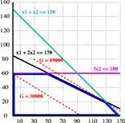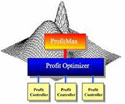Teaching and learning guides
The ten METAL teaching and learning guides are written primarily for lecturers and tutors, and present innovative and interactive approaches to teaching mathematical concepts to economics students. The guides include:
- Presentation of mathematics concepts.
- Top tips.
- Teaching and learning suggestions.
- Seminar activities, also available as separate files in .pdf or Microsoft Word format.

1. Mathematical Review
This guide is designed to set out some of the basic mathematical concepts needed to effectively teach economics at undergraduate level. The basic concepts covered by this guide are; arithmetic operations; fractions; percentages; powers; indices and logarithms, and the basic rules of algebra.
View/ download .pdf (984 KB)
Download Guide 1 Activity Sheets separately .pdf (216 KB) or Word (479 KB).
Guide 1 Operator Templates also available .pdf (21.9 KB) or Word (67 KB).
Permalink
Formative assessments can be selected from the maths e.g. Numbers and Algebra topics especially:
- BODMAS
- Fractions/Conversion
- Percentages
- Percentages/two changes
- Scientific notation
- Indices
- Expanding brackets/Linear & quadratic
- Quadratics/Two linear factors

2. Linear Equations
This Guide focuses on ways to help students grasp the meaning, significance and practical application of the equation of a straight line. Students will have opportunities to achieve a number of learning outcomes.
View/ download .pdf (890 KB)
Download Guide 2 Activity Sheets separately .pdf (95 KB) or Word (148 KB).
Permalink
Formative assessments can be selected from the maths e.g. Coordinate geometry topic especially:

3. Linear Equations - further topics
This Guide extends the analysis of linear equations to settings in which there is more than one equation, and where a solution to the system of equations is required.
View/ download .pdf (791 KB)
Download Guide 3 Activity Sheets separately .pdf (114 KB) or Word (400 KB).
Permalink
Formative assessments can be selected from the maths e.g. Algebra and Economics topics especially:
- Simultaneous equations/Linear & linear
- Profit, average and marginal functions
- Consumer and producer surplus

4. Linear Programming
This guide intends to serve as a useful resource for colleagues delivering linear programming to undergraduate students. Students are assumed to have a basic grasp of mathematics but there is no presumption that they have knowledge or any practical understanding of linear programming.
View/ download .pdf (995 KB)
Download Guide 4 Activity Sheets separately .pdf (206 KB) or Word (1,710 KB).
Permalink
Formative assessments can be selected from the maths e.g. Linear Programming topic especially:

5. Finance and Growth
This Guide is designed to set out some of the basic mathematical concepts needed to teach financial economics at undergraduate level. The concepts covered by this guide are; arithmetic and geometric series; Simple and compound interest; the time value of money; investment appraisal; and the NPV rule and the IRR rate of return rule.
View/ download .pdf (861 KB)
Download Guide 5 Activity Sheets separately .pdf (212 KB) or Word (281 KB).
Permalink
Formative assessments can be selected from the maths e.g. Algebra and Economics topics especially:
- Summations/Sigma notation
- Summations/Aps
- Interest/Simple
- Summations/GPs
- Interest/Compound/Discrete
- Interest/Compound/Continuous
- Growth & decay
- Sinking funds, annuities & perpetuities

6. Non-linear Equations
This guide attempts to promote the use of non-linear equations and functions with clear statements of why they matter within the study of economics. Key to this is the use of data and application to economic problems and use of economic principles to guide the mathematics.
View/ download .pdf (693 KB)
Download Guide 6 Activity Sheet separately .pdf (75 KB) or Word (108 KB).
Permalink
Formative assessments can be selected from the maths e.g. Algebra topic especially:
- Quadratic equations/Factorisable
- Quadratic equations/General quadratic equation
- Roots & factors of polynomials/Factors & Roots
- Expanding brackets/Linear & quadratic
- Factorisation/Quadratics/Two linear factors
- Factorisation/Cubics/Three linear factors

7. Differentiation
Differentiation lies at the heart of an introductory module or course in mathematical economics, but can present a number of significant challenges to students. These need to be dealt with before students become confident dealing with the rest of their degree course material. This guide includes an annex in PowerPoint format, which can be downloaded and adapted for use in class.
View/ download .pdf (835 KB)
Download Guide 7 Activity Sheets separately .pdf (47 KB) or Word (83 KB).
View/ download Annex Microsoft PowerPoint (339 KB)
Permalink
Formative assessments can be selected from the maths e.g. Differentiation and Economics topics especially:
- Polynomials
- Optimisation - single variable/Economics applications
- Elasticity/of Demand/point elasticity
- Theory of the firm/Profit, average and marginal functions

8. Partial Differentiation
This guide is designed to help lecturers set out the basic mathematical concepts and techniques needed for their students to effectively learn how to do economic analysis where a dependent variable is driven by two or more independent variables. The basic concepts covered are; partial derivatives, unconstrained optimisation, Lagrange multipliers and constrained optimisation.
View/ download .pdf (663 KB)
Download Guide 8 Activity Sheets separately .pdf (94 KB) or Word (95 KB).
Permalink
Formative assessments can be selected from the maths e.g. Differentiation and Economics topics especially:
- Elasticity/Partial elasticity of demand
- Partial differentiation/Polynomial
- Partial differentiation/Unconstrained optimisation
- Constrained optimisation/Lagrange multipliers

9. Integration
This guide does not intend to provide learning materials per se. Rather, it intends to help colleagues secure very good student learning by offering a resource which helps to deliver high quality teaching. Implicitly, the guide attempts to ‘bring alive’ the topic of integration and to engender in students an appreciation of what integration is, how it is applied, and how it can be used.
View/ download .pdf (677 KB)
Download Guide 9 Activity Sheets separately .pdf (90 KB) or Word (203 KB).
Permalink
Formative assessments can be selected from the maths e.g. Integration topic especially:

10. Matrices
This guide is designed to set out some of the basic mathematical concepts needed to teach economics and financial economics at undergraduate level. The concepts covered by this guide are; the dimensions of a matrix and surrounding vocabulary; addition, subtraction, multiplication and division of matrices; matrix transposition; matrix inversion; finding the determinant of a matrix; Cramer's rule; Input-Output analysis.
View/ download .pdf (1.08 MB)
Download Guide 10 Activity Sheets separately .pdf (178 KB) or Word (244 KB).
Permalink
Formative assessments can be selected from the maths e.g. Matrices and Economics topics especially:
- General
- Determinants/Square 2x2
- Determinants/Square 3x3 & 4x4
- Cramer's rule
- Multiplication/Square 2x2
- Multiplication/More than 2x2
- Inverse
- Input output analysis/Technical coefficients
- Input output analysis

METAL Project - Teaching and Learning guides by METAL Project is licensed under a Creative Commons Attribution-Non-Commercial 2.0 UK: England & Wales License.


